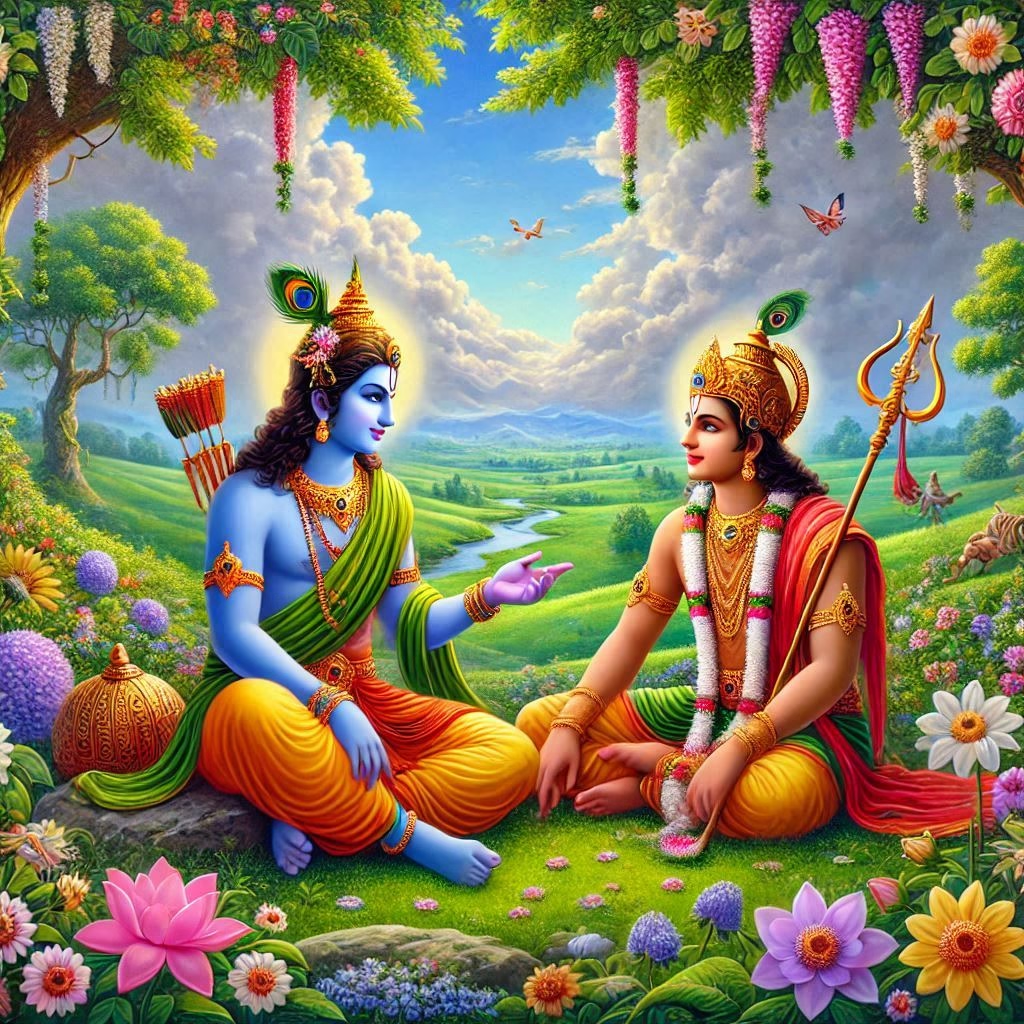Transform your connections with timeless lessons from Bhagavad Gita on love and relationships—explore devotion, empathy, and acting without attachment!
Introduction
What if ancient wisdom could teach us to navigate the complexities of modern relationships? The lessons from Bhagavad Gita on love and relationships provide us with timeless insights that remain incredibly relevant to the challenges we face today. Imagine building stronger connections free from expectations or selfish motives, embracing love not just as a fleeting emotion but as a divine energy that enriches our lives. This post will delve deep into the profound teachings of the Bhagavad Gita and how they can redefine your approach to love and relationships.
Embark on this journey and discover how the Bhagavad Gita guides us to practice devotion, compassion, and empathy while encouraging us to act without attachment and love without expectations. Whether you struggle with balancing emotional connections or yearn for a more fulfilling bond—this is a must-read.

Table of Contents
- Introduction
- Devotion and Compassion in Relationships
- Love Without Expectations: Embracing Selflessness
- A Perspective on Divine Love: The Love for the Divine
- The Power of Action Without Attachment
- Empathy and Emotional Connection: A Guiding Light
- Practical Applications in Modern Relationships
- Interactive Quiz
- FAQs Section
- Conclusion
- Disclaimer
Devotion and Compassion in Relationships
One of the most powerful lessons from Bhagavad Gita on love and relationships is the concept of devotion and compassion. The Gita emphasizes that true love arises from selfless devotion, be it towards a partner, family, friends, or even society. Devotion fuels a sense of duty and sacrifice, fostering deeper bonds.
Key Teachings:
- Krishna explains to Arjuna that love is not possessive or self-centered but flows freely when rooted in compassion.
- Compassion enables us to see beyond our own needs and consider the feelings of others.
- Love and devotion tied to higher virtues not only strengthen individual bonds but also uplift communities.
Case in Point: The story of Sudama’s visit to Krishna illustrates pure, unconditional friendship: a bond strengthened by devotion, unaffected by material needs.
By incorporating devotion and compassion in your relationships, you can nurture deeper, more meaningful connections, creating a space of mutual growth and understanding.
Love Without Expectations: Embracing Selflessness
The Bhagavad Gita teaches us that love without expectations is the purest form of love. When we remove selfish desires and ego from our relationships, we create a profound sense of trust and loyalty.
Key Lessons:
- Love becomes a liberating force when it is not based on transactional or conditional elements.
- Krishna advises Arjuna to act lovingly but without attaching oneself to the fruits of action.
- The essence of love is found in giving without the anticipation of receiving—a state of true grace.
Example Situation:
Consider a parent’s love for their child as a reflection of this lesson. A parent lovingly nurtures, educates, and sacrifices without demanding returns. Modeling this ideal can transform our modern relationships.
When understood and applied, this selfless approach not only elevates interpersonal relationships but also fosters contentment within. Love becomes a divine act rather than a means to satisfy personal desires.
A Perspective on Divine Love: The Love for the Divine
Another profound teaching from the Bhagavad Gita is the concept of divine love. This is not simply about religious devotion but understanding love as a connection to something eternal, universal, and transcendent. Krishna teaches that realizing divine love can fill all voids in our relationships.
Core Insights:
- When we direct love toward the divine, it helps purify our emotions and elevate our capacity to love others.
- Divine love is unconditional, infinitely forgiving, and immensely compassionate. It becomes a guide for how we approach human relationships.
- Such love helps us transcend feelings of jealousy, anger, and selfishness.
Example from the Gita:
Arjuna’s relationship with Krishna takes the form of a friend, student, and devotee. It demonstrates that divine love allows one to seek guidance, remain humble, and find strength even in turbulence.
By embracing this belief, we align our actions in relationships with kindness, patience, and understanding beyond worldly gains.
The Power of Action Without Attachment
“Act without being attached to the outcome.” This is one of the Bhagavad Gita’s central teachings. Applied to love and relationships, this means focusing on the quality of what you bring into the relationship without obsessing over what you get in return.
Key Learnings:
- Relationships should not be transactional. Instead, act lovingly because you choose to, irrespective of the outcome.
- Krishna counsels that attachment to results creates suffering. By relinquishing this attachment, you find peace and fulfillment in your actions.
- This approach reduces expectations, disappointments, and conflicts in modern relationships.
Practical Example:
Imagine helping your partner through a tough situation simply because you care—not because you seek gratitude or repayment. Over time, this creates a strong foundation of trust and respect.
Allowing love to flow selflessly and without the baggage of expectations will enrich relationships while lifting personal burdens of stress and insecurity.
Empathy and Emotional Connection: A Guiding Light
Empathy is central to forming and sustaining relationships, and the Bhagavad Gita speaks deeply about forging connections based on understanding and mutual respect. Love, guided by empathy, becomes inclusive and nurturing.
Key Insights:
- Empathy fosters a deeper emotional connection, bridging gaps created by misunderstandings or differences.
- Krishna emphasizes seeing others through the lens of unity, realizing that we are all interconnected in the grand fabric of life.
- By practicing empathy, one can resolve conflicts and build stronger, more respectful bonds.
Illustrative Example:
In modern relationships, empathy could mean listening to a friend’s struggles without judgment or focusing on understanding your partner’s emotional needs. This simple practice, deeply aligned with lessons from Bhagavad Gita on love and relationships, has transformative potential.
Empathy not only forges stronger personal connections but also empowers communities through shared compassion and harmony. When everyone feels seen and heard, relationships thrive effortlessly.
Practical Applications in Modern Relationships
While timeless, the lessons from Bhagavad Gita on love and relationships hold incredible insights for the modern era. Here are practical ways to implement these teachings:
- Practice Mindful Communication: Engage in conversations with clarity, intention, and without assumptions.
- Release Control: Avoid dominating the dynamics of your relationships; let others grow freely.
- Celebrate Small Acts of Love: Express gratitude for the little things in relationships while maintaining selflessness.
- Spiritual Practices Together: Meditate or perform yoga with your partner to strengthen your bond spiritually.
By executing even a few of these practices, you’ll notice a significant improvement in how you connect emotionally and spiritually with others. In the modern age, these thoughtful approaches can bring timeless wisdom to everyday situations.
Interactive Quiz
Let’s make this fun and engaging! Here’s a simple quiz for reflection on your relationships:
“What Type of Love Do You Practice?”
- Do you often expect something in return when you do something nice? (Yes/No)
- How often do you try to understand another person’s perspective? (Frequently/Occasionally/Rarely)
- Are you willing to give up your desires for the well-being of others? (Yes/No/Maybe)
- Do you react emotionally when a relationship doesn’t meet your expectations? (Often/Sometimes/Never)
Leave your answers in the comments below—let’s start a meaningful discussion!
FAQs Section
What are the best foods to improve mood when feeling sad?
Foods rich in omega-3 fatty acids, like salmon, nuts, and seeds, improve brain function and mood.
Which foods help lift mood quickly?
Dark chocolate, bananas, and berries can quickly boost your mood as they contain natural compounds that enhance serotonin levels.
What should I eat to feel happier instantly?
Try consuming a handful of nuts or a piece of dark chocolate for an immediate serotonin boost.
How can I boost my mood with food?
Include whole grains, leafy greens, and fermented foods like yogurt and kimchi in your diet for sustained mood-boosting effects.
Which foods naturally increase serotonin levels?
Foods like tofu, eggs, and pineapple are rich in tryptophan, a precursor to serotonin, promoting natural happiness.
Conclusion
Through devotion and compassion, selfless love, and divine connection, the lessons from Bhagavad Gita on love and relationships inspire us to become better individuals and partners. By relinquishing attachments and focusing on empathy, we can cultivate healthier, more harmonious connections.
Applying these teachings in everyday life encourages a deeper understanding of oneself and others, creating a ripple effect of positivity and stronger bonds. Don’t forget to share your thoughts and how these lessons have influenced your perspectives in the comments below.
Hey there, amazing supporters! We’re on a fantastic journey to make a difference, and we need your help! 🌈✨ Want to be part of something BIG? It’s simple! Just click the link below and show us your support! Every click counts, and together we can achieve incredible things! Let’s make a lasting impact—your involvement matters! 💪❤️
Thank you for believing in our mission! Let’s do this together! 🎉🚀
Unleash your curiosity! Dive into thrilling travel adventures, blockbuster movie insights, cutting-edge health tips, and the latest tech breakthroughs! For the freshest blog posts, visit Wanderers Blog. Don’t miss out—subscribe to our newsletter today!
Disclaimer
This article is for informational and educational purposes only and is not intended as a substitute for professional advice. The insights drawn from the Bhagavad Gita are subject to individual interpretation and may vary based on personal beliefs. Always consult appropriate experts or authorities when making decisions related to love, relationships, or spiritual practices.












